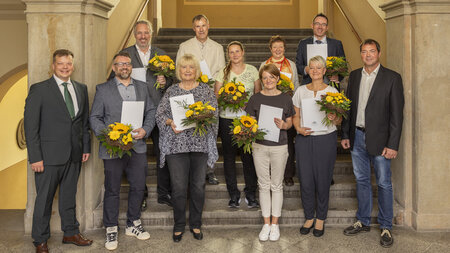M.Sc. Florian Thümer
| Room: | A12.014.2 | |
| Tel.: | +49 371 531 - 33828 | |
| Address: | Computer Achitectures and Systems Dept. of Computer Science, TU Chemnitz Strasse der Nationen 62 09111 Chemnitz, Germany |
|
| E-Mail: | florian.thuemer@… | |
| Consultation: | on appointment |
Thesis Title: Machine-Learning-Based Processing of LiDAR Point Clouds in Railway Environments
Description: The digitization of railway infrastructure represents a critical step toward enhancing the efficiency, safety, and sustainability of modern transportation systems. As global demands for higher rail throughput and reduced environmental impact intensify, the automation of train operations emerges as a pivotal solution. However, the transition from conventional systems to automated, digitally supported frameworks necessitates interdisciplinary research and development. Such systems must integrate advanced sensing technologies, real-time data processing, and adaptive control mechanisms to manage dynamic operational environments. Used within this context, LiDAR introduces unique challenges with the size of data and its nature of representing various objects as a sparse cloud of highly accurate point measurements.
Offered Thesis Topics:
| Bachelor: | Application of Color Correction on a Running Camera Feed | When recording raw image data of a camera sensor, environmental lighting has a large impact on the color temperature and -space of the resulting image. Within the scope of this Bachelor thesis, color values of recorded image data will be analyzed for the purpose of color correction, displaying whites and color values as accurately as possible. Requires knowledge of C++ and experience with Linux operating systems. |
| Master: | Implementation and Evaluation of an Online, AI-based Pedestrian Detector for LiDAR Point Clouds | Frameworks such as OpenPCDet enable training and evaluation of neural networks for object detection in point clouds, using public data sets. Within this Master thesis, the aforementioned framework will be adapted and re-structured to process a live recording of a running LiDAR sensor to detect pedestrians online. The developed system should be tested in a variety of scenarios to systematically evaluate the strengths and weaknesses of the detector. Requires knowledge of C++ and Python and experience with Linux operating systems. |
| Algorithmic Detection of Railway Track Mileage in Video Streams from a Train's Perspective | In German railway infrastructure, all sections of track are measured and marked with hectometer signs. These also play an important role in digital railway operations, as they remain useful to communicate the position of the locomotive to maintenance and operating personnel as well as rescue services. For this purpose, a system is to be designed that recognizes these signs in video recordings, automatically recording the displayed mileage information. The system must meet various complex requirements: Its functionality must be verifiable, and algorithms ought to be resource-efficient and effective despite many challenging conditions (uneven lighting, position, and appearance). Such a framework rules out the use of machine learning solutions. In-depth understanding of computer vision algorithms and high-performant programming (with optional real-time aspects) will form the basis of this work. Requires knowledge of C++ or Python. |





